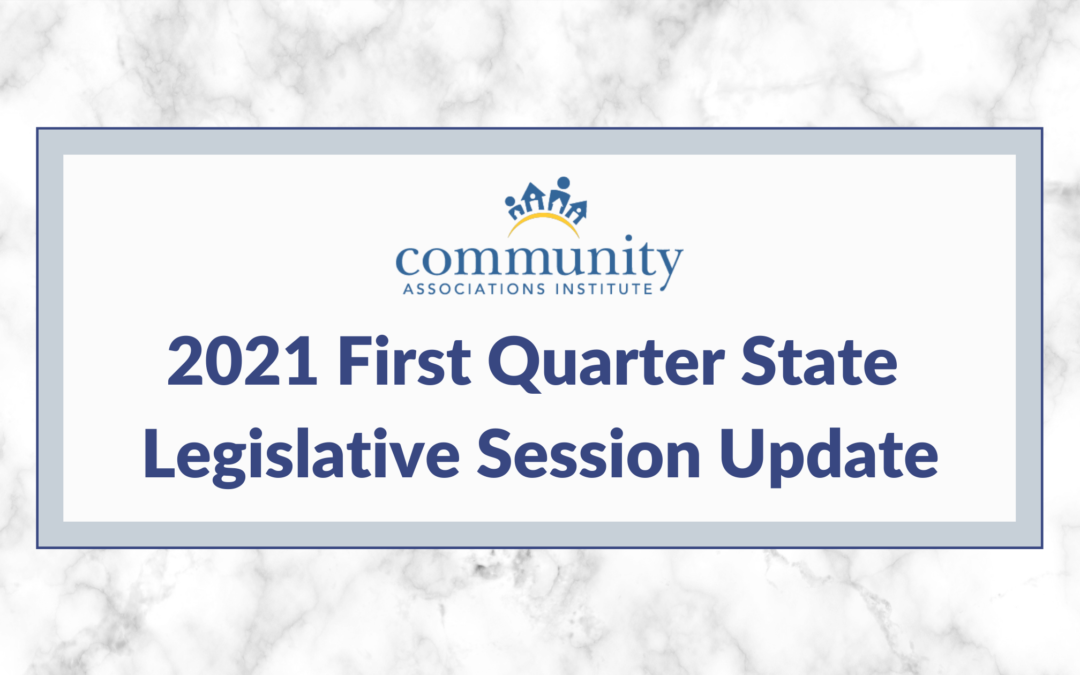Forty-seven states are currently in legislative session, with Utah and Virginia having already adjourned. CAI’s early predictions are proving true as many of these state legislatures are spending their sessions considering COVID-19-related legislation that will aid in recovery efforts. CAI’s state legislative action committees (LACs) continue to advocate—predominantly virtually with some in-person efforts—on behalf of the community association housing model.
CAI’s Government and Public Affairs team is currently tracking more than 1,000 bills across the country impacting community associations. Here is a summary of 2021 legislative trends for the first quarter of 2021.
Limited liability protections. CAI supports legislation that limits a community association’s exposure to liability when acting in good faith and complying with local and state ordinances and guidelines from the Centers for Disease Control and Prevention related to opening or reopening community amenities and governing association operations.
To date, 10 states have introduced legislation in 2021 providing limited liability protections, including Alabama, Colorado, Florida, Georgia (extension), Indiana, Maryland, Missouri, New Jersey, Oregon, and South Carolina. Alabama and Indiana have already passed these pieces of legislation with the support of CAI’s LACs and email campaigns. CAI’s LACs will continue to pursue liability protections in states without existing laws.
The following states passed laws in 2020 shielding community associations from lawsuits from residents and guests claiming COVID-19 exposure on association common property: Georgia, Iowa, Kansas, Michigan, Mississippi, Nevada, North Carolina, Ohio, Oklahoma, Tennessee, and Utah.
CAI developed two versions of limited liability model language for our legislative committees and lobbyists to present to legislators and ensure community associations are protected.
Virtual meetings. CAI supports legislation that allows community association board meetings and annual meetings of the membership to be held virtually. These meeting rules and regulations vary from state to state and often are contingent on an association’s governing documents. Many states require associations to follow a nonprofit or business corporation act. If an association’s governing documents are silent on virtual meeting regulations, the nonprofit or business corporation act may allow an association to hold them. CAI supports an option for community associations to hold meetings virtually during and after the pandemic.
While quite a few state statutes authorize board and annual meetings to be held virtually, many states will benefit from clarification and codification for permanent authority beyond the pandemic. To date, 13 states have introduced legislation this year that allow community associations to hold virtual meetings, including Connecticut, Georgia, Hawaii, Illinois, Maine, Maryland, Missouri, Oregon, Tennessee, Texas, Virginia, Washington and Wisconsin. Virginia already passed legislation this year amending the state’s Property Owners’ Association Act and Condominium Act to permanently allow, not mandate, virtual membership meetings subject to guidelines adopted by the association board of directors.
Electronic voting. CAI supports legislation that allows community associations to use electronic voting for elections. Electronic voting, if conducted properly, can increase engagement, save money, and provide a practical solution to in-person voting while keeping residents safe during the COVID-19 pandemic.
Four states have introduced legislation allowing community associations to vote electronically, including Hawaii, Maryland, Oregon, and Virginia. The Commonwealth has already passed legislation this year amending the state’s Property Owners’ Association Act and Condominium Act to permanently allow, not mandate, electronic voting subject to guidelines adopted by the association board of directors.
Removal of discriminatory and unenforceable restrictive covenants. To advance racial equity, CAI supports a process that allows a community association governing board to remove antiquated and unenforceable discriminatory restrictions contained in covenants without a vote of the homeowners. CAI advocates for states to adopt legislation that provides a process to remove restrictions deemed to be discriminatory under the federal Fair Housing Act and/or state anti-discrimination laws.
To date, 13 states have introduced legislation this year allowing a homeowners association or community association the ability to remove discriminatory and unenforceable restrictive covenants from their property’s documents, including California, Florida, Indiana, Illinois, Michigan, Montana, New Jersey, New York, Oregon, Texas, Utah, Washington, and Wyoming. Utah passed the bill introduced in the state with support of the CAI Utah LAC, whose members worked with the legislature to amend the bill to include community association boards.
If you have any questions, please reach out to CAI’s Government and Public Affairs team at government@caionline.org or (888) 224-4321. To read more about CAI’s 2021 advocacy priorities and resources, click here. To find out what your state legislative action committee is working on, click here.




Thank you for the update, Phoebe!